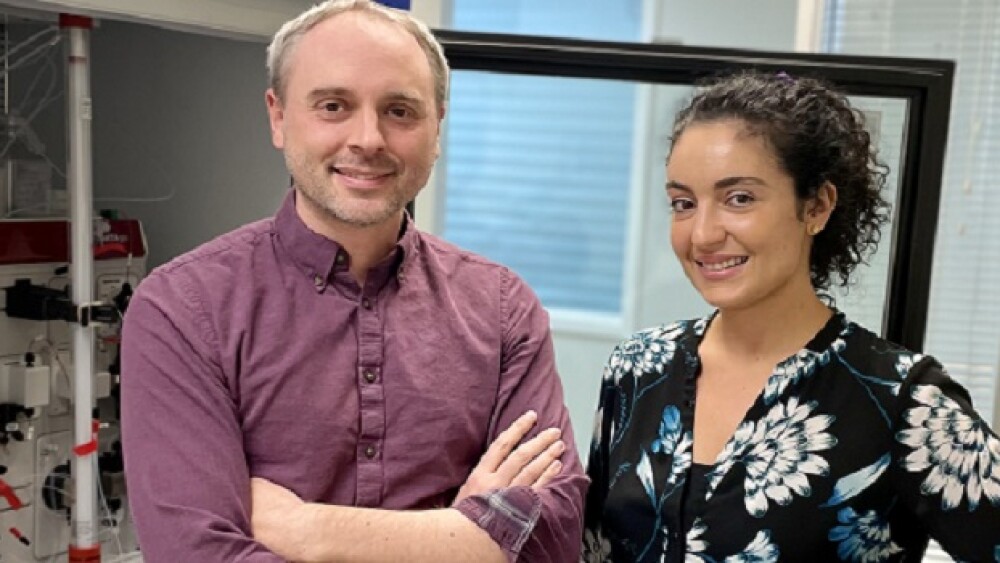Juvena Therapeutics pulled in $41 million in Series A financing to advance research into the therapeutic potential of secreted proteins to target chronic and age-related diseases.
Dr. Jeremy O’Connell and Dr. Hanadie Yousef, Cofounders of Juvena Therapeutics/Courtesy Juvena
Juvena Therapeutics has pulled in $41 million in Series A financing to research the therapeutic potential of secreted proteins to target chronic and age-related diseases, the company announced Tuesday.
The launch round was co-led by Mubadala Capital and Horizons Ventures and brings Juvena’s total funding to $50 million.
Juvena was co-founded by Dr. Hanadie Yousef, who specializes in research on the biology of aging and degenerative diseases, and Dr. Jeremy O’Connell, whose focus is on systems biology and proteomics.
Yousef told BioSpace that after studying proteins secreted by stem cells at U.C. Berkeley and discovering how these proteins could be used to reverse the effects of diseases, she went in search of a co-partner. She eventually met O’Connell, a fellow researcher at Stanford.
“We decided to combine forces and build a company to develop therapeutics where we are mapping secreted proteins to diseases in which they can have therapeutic effects and then translating them into engineered biologics,” Yousef said.
Juvena’s drug discovery platform is powered by artificial intelligence, which it uses to mine proteins secreted by these regenerative stem cells.
There are already FDA-approved biologics on the market that are based on classes of secreted proteins, like insulin and human growth hormone. The pharma industry has mostly studied secreted proteins as potential drug targets and biomarkers, rather than as drug agents themselves. Juvena’s team plans to use them as drug agents as well as develop biologics that target their pathways.
Yousef said the proteins have “tremendous” therapeutic potential, but currently, they remain “understudied and under-utilized.” This is largely due to challenges like a low abundance of the proteins, higher structural complexity and the amount of research and mapping required to target specific cells.
“We have overcome these limitations by leveraging the latest technologies in quantitative proteomics combined with machine learning, sequencing technologies and bioinformatics, as well as high content imaging,” Yousef said.
The team has subsequently built a “comprehensive, systematic platform that enables us to map secreted proteins to cells in tissues in which they are binding and measure their phenotypic response.”
Initial Focus: Myotonic Dystrophy Type 1
Though Juvena will target several different diseases, a bulk of its research so far has been in myotonic dystrophy type 1, a rare neuromuscular disease that has no cure.
Yousef said that when her team first started its research, they decided to focus on identifying a protein that can promote muscle regeneration and generate hits. From those hits, they found three to move into preclinical mouse models of muscle-wasting diseases, eventually choosing the one with the greatest efficacy.
“Once we understand the mechanism by which they’re working, we can match them to specific diseases within the therapeutic area,” she said. “That’s what led us to myotonic dystrophy.”
Juvena then received $4.2 million in grants from the California Institute of Regenerative Medicine and the National Institutes of Health to develop the therapeutic. Yousef said the company plans to apply for several million dollars in additional grants to take the therapeutic all the way to FDA approval.
As for future plans, Yousef said Juvena has already generated dozens of hits in three different therapeutic areas: cardiometabolic, inflammatory and skeletal diseases. She added that she is “very excited” to partner with biopharma companies that want to use Juvena’s platform in other therapeutic areas, and ultimately, take these therapeutics into the clinic.





